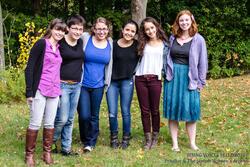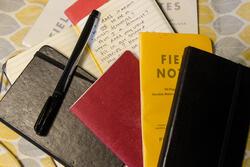Where Are They Now? RVF Alum Hannah Elbaum
To celebrate the 10th anniversary of JWA’s Rising Voices Fellowship (RVF), we’re running a series of interviews with RVF alums. First up: Hannah Elbaum, a Jewish educator and books enthusiast who participated in the very first fellowship cohort.
JWA: Tell us what it was like participating in the first cohort of the Rising Voices Fellowship in 2013-2014.
Hannah Elbaum: Doing something new is always a big leap of faith. Rising Voices was brand new back then and has evolved significantly since then. I most loved the writing and editing process that we undertook each month for our blog posts. My program leaders, Emilia Diamant and Jordyn Rozensky, offered such kind and guiding feedback, often in the form of questions, to help me clarify my thinking and therefore express myself clearly. Through them responding to my voice and writing with such intention, I began to have confidence that my words mattered and that readers could learn from my perspective.
JWA: What were the impacts of the fellowship on your high school self?
HE: I loved Rising Voices! In high school, as I think many other teens feel, I was eager to move my life forward and expand beyond my personal bubble. Writing on a semi-professional level felt like I was no longer a child, and this was part of my transformation into adulthood. RVF also gave me a space that felt safer to explore ideas and express myself with other people who felt passionately about feminism. At my school at the time, "feminism" as a word was met with smirks or scoffs, and the RVF leaders and fellows never made me feel as though my ideas were unworthy or silly.
JWA: How has RVF continued to influence you as an adult?
HE: Rising Voices was an early step in a chain reaction that guided me to where I am today. After writing my college admissions essay about RVF, I attended Smith College, an institution known for its feminist leadership. I loved tapping into that part of my identity and learning, but eventually I missed the Jewish community and moved back to the Boston area to work at a synagogue as a Jewish educator.
JWA: You work at a synagogue in eastern Massachusetts as the assistant director of an elementary learning program and the Hebrew coordinator. Can you tell us about these roles?
HE: Working in a large congregation with a dedication to learning has been an amazing experience. I've been here since I graduated from college, gradually gaining responsibility until I've reached my current roles where I support the K-4 elementary learning program called Mayim (meaning "water;" it's our take on Hebrew School), and the Hebrew learning components of our programs ,which begin in third grade and follow children through their B. Mitzvah. With programs that engage over 500 children in grades K-7, we have so much possibility to creatively innovate and offer expansive learning opportunities. Last year I made a mini-podcast with third graders about Pirkei Avot (Wisdom of our Ancestors)! Working on teams that are excited to be here and work with young Jewish kids is sometimes surprising, sometimes very funny, and always wonderful.
JWA: Your Instagram account devoted to books, @HannahsLibraryCard, gives reading recommendations to over 1,600 followers. What Jewish/feminist books have you read recently that you're excited about?
HE: I just finished Don't Forget to Write by Sara Goodman Confino, which was amazing! It's set in the 1960s on the East Coast and our main character, Marilyn, is bucking the expectation from her father (and society) that she will get married soon. As a punishment for one of her recent adventures (this one with the rabbi's son, during services), she is sent to spend the summer with her great-aunt Ada, but it doesn't turn out to be quite the punishment Marilyn expected. It was feisty, feminist, and had all the other things I love in a book: some historical aspects, books that mention other books, a bit of romance, and a cranky old aunt who has a lot of wisdom to share.
Also, if anyone hasn't yet read Thistlefoot by GennaRose Nethercott, it's entirely different and fuses magical realism, historical fiction, collective memory, and a fascinating sibling dynamic all in between two gorgeous covers. It blew my mind! Abby Richmond's review in JWA shares more!
JWA: What advice do you have for young people discovering their Jewish and feminist identities?
HE: When I was a teen, I thought that I had to figure out my beliefs and then be set in them. Looking back, I can see how much I’ve learned and grown, and am continuing to learn things every day—from my colleagues, the media, my family—that shift my identities and views. I once heard that the more you learn the more you realize you don't know yet, and that becomes more true every day. The world will change, and you will change, so just keep learning.
This piece was written as part of JWA’s Rising Voices Fellowship.







